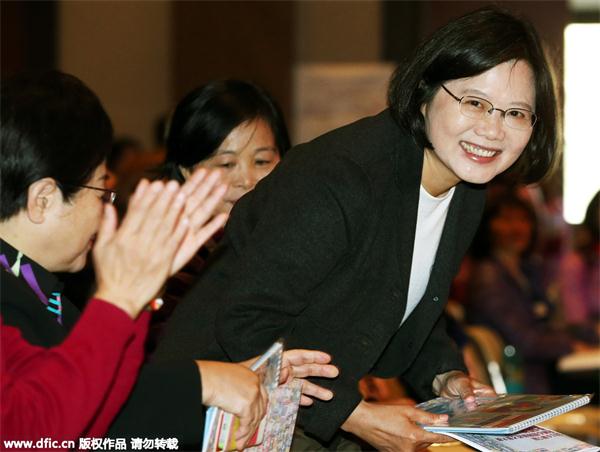Here's why Tsai must endorse 1992 Consensus
Updated: 2016-05-04 08:23
By DENNI S V. HICKEY(China Daily)
|
|||||||||
 |
|
Democratic progessive party leader Tsai Ing-wen attends to the talent competition of children with mental disabilities in Taiwan. [Photo/IC] |
Following Ma Ying-jeou's election in 2008, Taiwan endorsed the 1992 Consensus. Under this arrangement, both Taiwan and the Chinese mainland accept the principle of "one China", but each side holds its own interpretation of what that means.
By doing so, Ma enabled cross-Straits relations to move forward. Negotiations between Taiwan's Straits Exchange Foundation and the mainland's Association for Relations Across the Taiwan Straits re-opened for the first time in more than a decade. By 2016, senior cross-Straits officials from the two sides had met seven times and a total of 23 cross-Straits agreements had been signed. The number of direct cross-Straits flights soared from zero to 120 per day. Millions of mainland tourists visited Taiwan. And the mainland is now the island's largest trading partner.
International observers praised the progress in cross-Straits relations. Support for the rapprochement was even enshrined in the 2010 National Security Strategy of the United States. Even US President Barack Obama declared:"I am very pleased with the reduction of tensions and the improvement in cross-Straits relations."
Ma's solid achievements in cross-Straits relations represented a conundrum for Tsai Ing-wen's election campaign because her Democratic Progressive Party still supports "Taiwan's independence". An endorsement of the 1992 Consensus might have alienated key DPP constituencies. But an open abandonment of the 1992 Consensus would have provoked the mainland, frightened Taiwan compatriots and alarmed the global community.
In order to cope with the challenge, Tsai opted to sidestep the issue by claiming to support the status quo and handle relations with the mainland in accordance with "the will of the Taiwan people" and "Taiwan constitution". Throughout her campaign, she refused to elaborate on her vague approach to cross-Straits relations.
The election campaign is now over and Tsai will assume the island's leadership on May 20. She could use the opportunity to explicitly endorse the 1992 Consensus. And she has five reasons to do so.
First, Tsai was careful not to reject the 1992 Consensus during her campaign. Rather, she described it as an "option". On May 20, Tsai will possess the power to choose or reject an option. Hopefully, she will choose wisely.
Related Stories
Tsai should rein in her party's extremists 2016-04-08 08:06
Tsai plays dumb charade across Straits 2016-03-25 08:28
Tsai's choice critical for cross-Straits ties 2016-03-07 08:05
Onus on Tsai to maintain good cross-Straits ties 2016-03-01 10:35
Tsai faces the test to keep cross-Straits ties on track 2016-01-18 07:58
Today's Top News
Inspectors to cover all of military
Britons embrace 'Super Thursday' elections
Campaign spreads Chinese cooking in the UK
Trump to aim all guns at Hillary Clinton
Labour set to take London after bitter campaign
Labour candidate favourite for London mayor
Fossil footprints bring dinosaurs to life
Buffett optimistic on China's economic transition
Hot Topics
Lunar probe , China growth forecasts, Emission rules get tougher, China seen through 'colored lens', International board,
Editor's Picks

|

|

|

|

|

|







